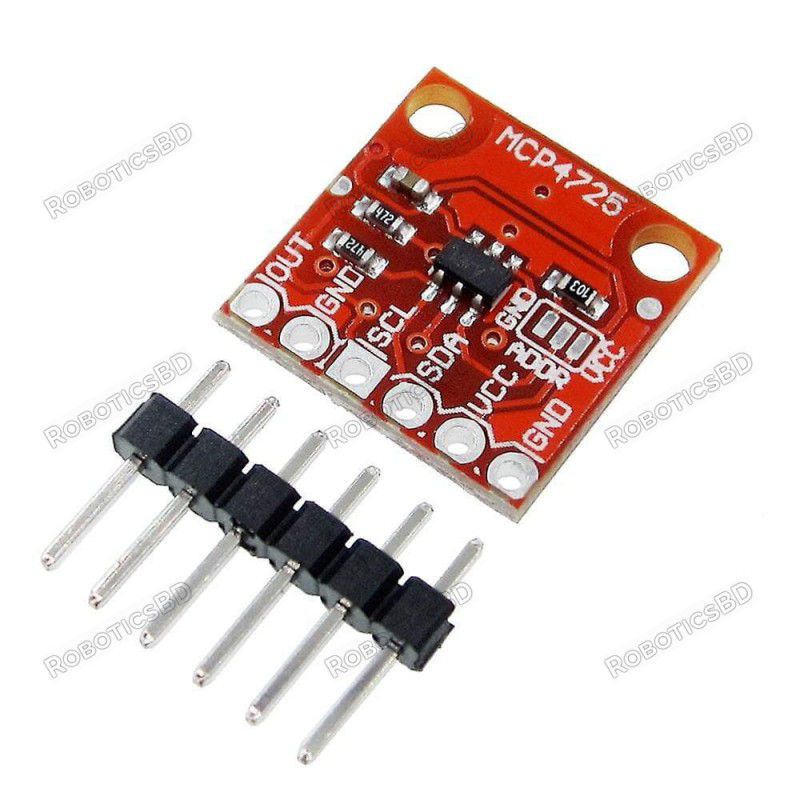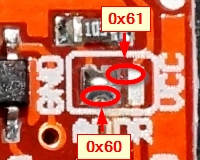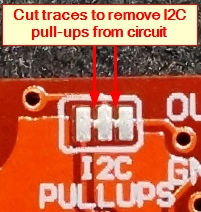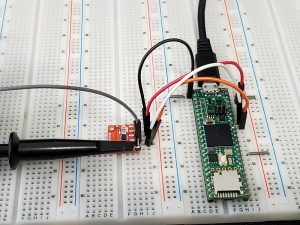
Reference: RBD-1354
Jumper Wire Single 20cm
Length: 8 inches/20 CM (Long) Material: Copper Plated Pin Spacing: 2.54mm.
Reference: RBD-1354
Length: 8 inches/20 CM (Long) Material: Copper Plated Pin Spacing: 2.54mm.
Reference: RBD-0351
Contactless transmission of data and supply energy (no battery needed) Operating distance: Up to 100mm (depending on antenna geometry) RoboticsBD Operating frequency: 13.56MHz Data transfer: 106 kbit/s Data integrity: 16 Bit CRC, parity, bit coding bit counting Anticollision Typical ticketing transaction: <100 ms ( including backup management)...
Reference: 0245
Choose your desire Resistor value from below:
Reference: 0031
3 Types Available (Please select from option) 1. Male to Male 2. Male to Female 3. Female-Female
Reference: RBD-0768
Size: 5mm Color: RED Head Shape: Round Lens Appearance: Transparent
Reference: 1353
Length: 12.5 inches/30 CM (Long) Material: Copper Plated Pin Spacing: 2.54mm.
Reference: RBD-0761
Breadboard friendly Mounting Style: Through Hole Mounting Direction: Vertical


Precision 12-bit Digital-to-Analog converter with I2C interface
 Store Pickup Available!
Store Pickup Available!
 Free Ship Over 5000 BDT
Free Ship Over 5000 BDT
 Quality Product
Quality Product
 No Warranty
No Warranty
 No Replacement
No Replacement
The MCP4725 module is a precision 12-bit Digital-to-Analog converter with I2C interface for adding a true analog voltage output to Arduino and other MCUs.
One of the annoying things about most MCUs is that they do not contain a true analog output. Instead they provide PWM which simulates an analog voltage output by switching a digital output on and off rapidly at different duty cycles. This works fine for many applications, but sometimes you need an actual analog voltage output that is computer controlled. That is where this module comes in.
The 12-bit single output provides 4096 steps of resolution. For a VCC of 5V, the step size will be 5V/4095 = 1.22mV.
Typical settling time of the output is 6uS. This is the time from when a new value is written into the device until the output voltage reaches the new value.
The maximum amount of current that the output can sink or source is 25mA. The output can be used to directly drive lower current applications or it can be buffered to provide a higher current capability or to allow the voltage to swing both positive and negative.
Setting I2C Address

I2C Address Jumpers
The module has an easy to use I2C interface that can be configured to use one of two different I2C addresses if you want to use multiple modules in the same system or if you run into an address conflict with another device.
The address is set by bridging 2 of the 3 small solder pads on top of the module marked ‘ADDR’. The center pin is attached to the A0 address pin on the MCP4725 chip. Next to it are a GND and a VCC pin. A solder blob is used to bridge either the ground or VCC to the A0 pin thus either pulling it to ground via a 10K resistor or tying it to VCC.
As-shipped, the GND and center pin are bridged and so the A0 pin is grounded and the default I2C address is 0x60 as shown in the picture to the right.
If it is desired to change the address, the solder blob can be removed and the center pin and the VCC pin can be bridged with solder instead.
I2C Pull-Up Resistors

I2C Pull-Up Resistor Cut Straps
The module includes two 4.7K pull-up resistors on the I2C SCL and SDA lines.
If you are hooking up two of these boards on the same I2C bus, these resistors may need to be removed from all but one of the modules if the communications act flaky, but in our testing it hasn’t been necessary.
If it is necessary to remove the pull-up resistors, there are 3 small pads on the back of the board with traces connecting them. To disconnect the pull-ups cut the both trace between the pads. Alternatively the two 4.7K resistors labeled “472” on the top of the board can be removed.
If you decide later to reconnect the pull-ups, simply bridge the 3 pads with some solder.
The MCP4725 includes a built-in EEPROM that can be used to save the settings when the device is powered down. This includes the data value for the DAC output which can be handy in some applications because it allows the device to power up and output a particular voltage without needing to be reprogrammed by an MCU. This can be important if the device is being used to provide a calibration voltage or something similar.
Note that EEPROMs have finite write cycles, typically around 20,000 or so and doing the programming takes a little time. For that reason values should only be programmed into the EEPROM when it is important to remember them and not just do it every time the DAC values are updated if they are being updated continually.
This module comes with the header loose. This allows you to configure the module to meet your particular requirements such as which side of the board you want the header on or if you want to solder on wires to make the connections.
For use with breadboards, we put the headers on the bottom so that the module can plug directly into the breadboard.
If you are working with the module using an O’Scope, you may find it handy to separate the header into two pieces and place the 2-pins for the output voltage and ground connections on top of the board for easy hook-up using O-scope probes while placing the other 4-pins on the bottom of the module.
The connections to the module are fairly simple.
1 x 6 Header
Some info on the internet suggest using digital outputs of an MCU to provide VDD and ground for the module by driving the outputs high and low respectively. While this can be done, it limits the output swing to be between what a logic LOW and logic HIGH voltage is. Also keep in mind that VDD is also the reference voltage for the DAC, so noise on this or the ground can affect the accuracy of the output.
These modules have good build quality and are very useful for creating a fairly precise analog voltage.
Getting up and running with a basic setup is easy with these modules using the Adafruit_MCP4725 library as shown in the example below. There are a couple of example files that are installed when the library is installed. The library can be easily installed from within the IDE.
This test setup just requires the connections shown below. We are hooking up the DAC output to a O’scope input in our case. You could also use it to drive an LED with a series current limiting resistor and adding a delay between each DAC write to slow things down enough to easily see it.
The output of the program as written creates a triangle wave on the output by just ramping the DAC voltage up and then back down through its full range. The resultant frequency in our Uno setup results in a triangle wave with a frequency of a little less than 1Hz as shown below.

The program we are using is a slightly modified version of one of the sample programs ‘trianglewave’ that comes with the library.
/* MCP4725 12-bit DAC Test Program Basic code to test the MCP4725 DAC Module. Simply ramps the output up and down through its full range to give a triangle waveform output. Module connections: VCC = 3.3 or 5V to match MCU Gnd = Ground SCL = SCL on MCU SDA = SDA on MCU OUT = Connects to measurement device Uses Adafruit MCP4725 library which can be downloaded via IDE */ #include <Wire.h> #include <Adafruit_MCP4725.h> Adafruit_MCP4725 dac; //=============================================================================== // Initialization //=============================================================================== void setup(void) { dac.begin(0x60); // Set I2C address to default 0x60 } //=============================================================================== // Main //=============================================================================== void loop(void) { uint32_t count; // Cycle through the full 12-bit scale to create a triangle wave for (count = 0; count < 4095; count++) // Ramp UP { dac.setVoltage(count, false); // Set DAC voltage value. } // False = Don't save setting in EEPROM for (count = 4095; count > 0; count--) // Ramp DOWN { dac.setVoltage(count, false); } }
The latest price of MCP4725 12-Bit DAC Module in Bangladesh is BDT 280 You can buy the MCP4725 12-Bit DAC Module at best price from our RoboticsBD or visit RoboticsBD Office.
|
Please note that the product information provided on our website may not be entirely accurate as it is collected from various sources on the web. While we strive to provide the most up-to-date information possible, we cannot guarantee its accuracy. We recommend that you always read the product labels, warnings, and directions before using any product. |
|
Product Images are shown for illustrative purposes only and may differ from the actual product. |



Reference: RBD-0402
Ultra-thin design & adhesive backing provides easy integration to any project Excellent price-performance ratio Easy communication with any microcontroller 5 pins 2.54mm pitch connector, 4x 4type 16 keys. Sticker can peel off for adhesive mounting. RoboticsBD Operating Voltage (V): 12 DC
Reference: RBD-3591
Enhance your Arduino Nano projects with the NANO3.0 Data Logging Expansion Board (Welded)—a feature-rich shield designed to bring time-stamped data storage functionality to your embedded systems. With its built-in SD card interface, Real-Time Clock (RTC), and 3.3V level shifter, this board is perfect for applications involving environmental monitoring,...
Reference: RBD-2304
WS2812B RGB LED 24-Bit Ring with individually addressable LEDs Features 24 WS2812 5050 RGB LEDs in an 86mm outer diameter circular board Constant current drive (~18mA per LED) for consistent brightness at 5V Requires a microcontroller with an 8MHz or faster processor for precise control Equipped with solder pads and mounting holes for easy integration
Reference: RBD-2758
With this module you can easily measure sound with an analog pin on your Arduino or other microcontroller. The module has an automatic gain/amplification (ACG) of the microphone: The module amplifies sounds with a low volume more, and sounds with a higher volume less.
Reference: RBD-3166
The GY-SI5351 Clock Signal Generator Module is a versatile and precise clock generation device, capable of producing multiple independent frequencies with minimal error. Controlled via I2C, this module is perfect for applications requiring precise frequency synthesis for audio, video, communication, and general electronic projects. With three independent...
Reference: RBD-2727
Module can be used to expand the digital I/O of an MCU using the I2C bus.
Reference: RBD-2565
Mosfet switch module on breakout board with screw terminals and pin headers. Useful for controlling high power loads (max 24V / 5A) using 3.3V / 5V logic circuits.
Reference: RBD-0383
Wide Supply Range: 2.0v To 5.5v Low Current Consumption Continuous Mode: Only 150µa Single-shot Auto Shut-down Programmable Data Rate: 8SPS to 860SPS It has Internal low-drift voltage reference
Reference: RBD-3261
The ESP8266 Witty Cloud ESP-12F WiFi Module is a powerful WiFi enabled processor in a compact package that incorporates an RGB LED, LDR light sensor and pushbutton for easy stand-alone operation.
Reference: RBD-2314
8-bit WS2812B 5050 RGB LED Development Board with built-in full-color driver Individually addressable LEDs for customizable lighting effects Daisy chain support for cascading multiple boards in a series Operates at 4-7V DC with a recommended 5V supply for optimal performance Compact straight PCB design for decorative and notification lighting projects
Reference: RBD-2142
Operating Voltage: 5VDC USB to Serial Converter: CH340C Compatible With:ESP8266 ESP-01/01S Comes With Onboard Reset Switch Has Female Headers for Connecting the Wifi Module.
Reference: RBD-3286
The Serial MP3 Music Player Module V1.3.2 is a compact and easy-to-use audio playback module that supports MP3 and WAV file formats. Designed for seamless integration into microcontroller-based projects, this module enables high-quality audio playback with simple UART TTL serial control. This module is highly compatible with platforms like Arduino,...
Reference: RBD-2415
Dual PS2 Joystick Module: Two joysticks with X and Y axis analog control for versatile input options. Integrated Push-Button Switches: Each joystick includes a built-in push-button for additional input. Arduino Compatible: Seamlessly integrates with Arduino boards for interactive projects. Compact Design: Module dimensions of 65.1x53.8 mm for easy...
Reference: RBD-3265
The Adjustable Delay Timer Dual Relay with LED Display is a highly versatile and reliable timing module designed for precision control over two independent devices. Featuring an adjustable delay time and dual relay design, this module allows for custom automation, making it perfect for a wide range of DIY projects, industrial automation, and home...
Reference: RBD-1928
Frequency: 2.4GHz ISM. Protocol: BLE 4.0. Max transmitting power: max. 4dBm. Modulation System: GFSK. Serial Baud Rate: 1200 to 115200 bps. Reference Distance: 80 meters.
Reference: RBD-2340
2-channel PWM pulse frequency and duty cycle adjustable signal generator module Generates square and rectangular waveforms for experiment and development Frequency range: 1Hz to 150KHz, adjustable in three precision levels Features serial port control with customizable PWM settings via commands Compact design (44x30x11mm) with 5–30V DC operating voltage
Reference: RBD-3279
The GY-NEO-7M V2 GPS Module is a high-performance GNSS receiver module designed for accurate navigation and positioning applications. Built on the u-blox M8 GNSS engine, this module supports multiple satellite systems, including GPS, GLONASS, Galileo, BeiDou, QZSS, and SBAS, ensuring fast and precise location tracking.
Reference: RBD-0386
1 Hz output pin SQW. 32 KHz output pin 32K. RoboticsBD Voltage Supply: 2.2 V ~ 5.5 V (for RTC). Time Format: HH: MM: SS (12/24 hr). Date Format: YY-MM-DD-dd. DS 3231 based RTC with 2032 Battery Holder. RoboticsBD Battery is not included Note: Batteries not included.
Reference: RBD-0559
Power supply: DC 7-30 V Input Voltage: 0-10V Output current: 4-20mA 0-5V to 4-20mA Linear Conversion
Reference: RBD-3139
The SI4713 FM Transmitter Module is a digital stereo frequency modulation module designed for high-quality audio transmission. Powered by a 3-5V DC supply, this module offers easy integration with microcontrollers via I2C or SPI communication, making it ideal for projects requiring wireless audio broadcasting. Its compact design and versatile control...
Reference: RBD-1021
Operating voltage: 2.5V-5.5V, recommended 5V Speaker Load: 2-8 Ohms Input and Output Connectors: Pins on 0.2" centers Size: 24 x 23 x 105 mm (L x W x H) Net weight: 3g
Reference: RBD-2323
NeoPixel WS2812B 5050 RGB LED Module with integrated smart driver Produces 24-bit true-color display with over 16 million colors Daisy-chain multiple modules with a single microcontroller data signal Compatible with Arduino, STM32, 51, and other microcontrollers Compact 14mm x 12mm module with bright and consistent 5050 LEDs
Reference: RBD-0400
Voltage: 3-3.6V (recommended 3.3V) V. Maximum output power: +20dBm. Power-down mode current: 4.2uA. Operating Range: 1Km Antenna Gain (peak): 2Dbi. 2MB rate (Open area): 520m. 1MB rate (Open area): 750m. 250Kb rate (Open area): 1100m. It uses 2.4GHz global open ISM band, with license free. SPI interface facilitates the communication with MCU I/O port....
Reference: RBD-1750
Operating Voltage: 3- 12 VDC Amplification: Adjustable 1.5~1000 times Signal Input Voltage Range: 100µV~300mV Signal Output Range: 100µV~300mV
Reference: RBD-3272
The PCF8563 RTC Module is a low-power real-time clock and calendar chip designed for accurate timekeeping in embedded systems and microcontroller applications. This module communicates using the I2C bus, making it easy to interface with microcontrollers such as Arduino, Raspberry Pi, ESP32, and STM32. Equipped with alarm, timer functions, and a...
Reference: RBD-3046
On-chip power-on reset circuit, on-chip voltage regulator: 3.45 V output Compliant with USB specification 2.0 standard; full speed (12Mbps) USB suspend status via SUSPEND and /SUSPEND pins Integrated 194-byte one-time programmable ROM for storing customizable product informationComes without soldering
Reference: RBD-0196
Brand: DFRobot
The APC220 radio module offers a cost-effective solution for wireless data communications, featuring an embedded high-speed microprocessor and high-performance IC. With its transparent UART/TTL interface, it eliminates the need for packetizing and data encoding, making it a popular choice among customers seeking better range performance at a low cost.
Reference: RBD-3260
The ESP32-S Screw Terminal Adapter is a convenient breakout board designed to mount 38-pin ESP32-S development boards, making it easy to interface with external wiring. It features screw terminals and female headers for each pin, providing a secure and organized wiring solution for projects that require multiple external connections. This adapter...
Reference: RBD-1923
Conversion range: 0% -100% PWM to 0-10v voltage PWM signal reception frequency range: 1KHz – 3KHz Operating voltage: 12V – 30V DC Allowable error: 5%
Reference: RBD-2320
MG996R 360° Continuous Rotation Servo Motor with high torque up to 11kg/cm Features durable all-metal gears and double ball bearing design for stability Operates at 4.8V–7.2V with stall current up to 2.5A at 6V Ideal for robotics, camera sliders, and applications requiring continuous rotation Compact design with a weight of 55g and dimensions of 40.7 x...
Reference: RBD-3403
The GY-271 HMC5883L 3-Axis Magnetometer Sensor Module is a high-precision digital compass that measures the strength and direction of magnetic fields in three axes (X, Y, Z). Designed for robotic navigation, orientation detection, and motion tracking, this compact and efficient module is perfect for projects requiring accurate geomagnetic field...
Reference: RBD-2367
ESP32-S3-WROOM-1-N16R8(16M Flash/8SRAM) Powerful ESP32-S3 chip for enhanced processing capabilities Dual Type-C USB ports for easy connectivity Built-in Wi-Fi and Bluetooth for seamless communication 16MB flash memory for ample storage space 8MB PSRAM for efficient multitasking Micropython support for easy programming Ideal for IoT projects, robotics, and...
Reference: RBD-0104
Chip built-in 16bit AD converter, 16-bit data output Driver Chip: MPU6050 Operating Voltage: 3-5V DC Communication: I2C/IIC Protocol Gyro Range: ± 250, 500, 1000, 2000 °/s Accelerometer Range: ± 2 ± 4 ± 8 ± 16 gChip Origin: InvenSense
Reference: RBD-0009
54 Digital I/O terminals (14 of which have programmable PWM outputs). 16 Analog Inputs. 4 UARTs (hardware serial ports). 16 MHz crystal clock. RoboticsBD Operating voltage: 6 ~ 12v. Dimensions: 110 x 53 x 15 mm.
Reference: RBD-2296
15KV High-Frequency DC High Voltage Arc Ignition Generator Inverter Boost DIY Kit Produces a stable high-frequency arc with elevated temperatures for ignition applications Suitable for science experiments, negative ion generators, and DIY electronic projects Input voltage: 3.7V-4.2V; Output voltage: approximately 15KV with ≤0.5cm ignition distance Compact...